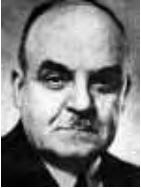
Dobri Bozhilov
Encyclopedia

World War II
World War II, or the Second World War , was a global conflict lasting from 1939 to 1945, involving most of the world's nations—including all of the great powers—eventually forming two opposing military alliances: the Allies and the Axis...
.
Born in Kotel
Kotel, Bulgaria
Kotel is a town in central Bulgaria, part of Sliven Province. It is the administrative centre of the homonymous Kotel Municipality. As of december 2009, the town has a population of 6,232 inhabitants....
, Bulgaria
Bulgaria
Bulgaria , officially the Republic of Bulgaria , is a parliamentary democracy within a unitary constitutional republic in Southeast Europe. The country borders Romania to the north, Serbia and Macedonia to the west, Greece and Turkey to the south, as well as the Black Sea to the east...
, Bozhilov attended the Higher Commercial School in Svishtov
Svishtov
Svishtov is a town in northern Bulgaria, located in Veliko Tarnovo Province on the right bank of the Danube river opposite the Romanian town of Zimnicea. It is the administrative centre of the homonymous Svishtov Municipality...
before starting work as a bookkeeper at the Bulgarian National Bank for the Kyustendil Banking Agency in 1902. Bozhilov worked for the Bulgarian National Bank for a total of 36 years and served at various times as its governor (1922-1923, 1923-1924, 1931-1932, 1934-1935, 1935-1938, 1944). In November 1938, Bozhilov became Minister of Finance in the government of Prime Minister Georgi Kyoseivanov
Georgi Kyoseivanov
Georgi Ivanov Kyoseivanov was a Bulgarian politician who went on to serve as Prime Minister.Kyoseivanov came to power on 23 November 1935 after a period in which the country had had three Prime Ministers in quick succession...
, a position which Bozhilov kept when Bogdan Filov
Bogdan Filov
Bogdan Dimitrov Filov was a Bulgarian archaeologist, art historian and politician. He was Prime Minister of Bulgaria during World War II. During his service, Bulgaria became the seventh nation to join the Axis Powers....
became prime minister
Prime minister
A prime minister is the most senior minister of cabinet in the executive branch of government in a parliamentary system. In many systems, the prime minister selects and may dismiss other members of the cabinet, and allocates posts to members within the government. In most systems, the prime...
in 1940. In 1943, after Tsar Boris III died, Filov became one of Bulgaria’s three regents. Filov, a fervent ally of Nazi Germany
Nazi Germany
Nazi Germany , also known as the Third Reich , but officially called German Reich from 1933 to 1943 and Greater German Reich from 26 June 1943 onward, is the name commonly used to refer to the state of Germany from 1933 to 1945, when it was a totalitarian dictatorship ruled by...
and the most powerful of the regents, used his power to appoint Bozhilov (another pro-German) prime minister.
As prime minister, Bozhilov worked closely with the Nazis, virtually becoming their puppet as World War II
World War II
World War II, or the Second World War , was a global conflict lasting from 1939 to 1945, involving most of the world's nations—including all of the great powers—eventually forming two opposing military alliances: the Allies and the Axis...
raged. Essentially the only major issue on which he clashed with the Nazis was their demand for Bulgaria’s government to deport the country’s Jews to extermination camps, which Bozhilov refused to do. (For more information see F. B. Chary, The Bulgarian Jews and the Final Solution) In June 1944, at which time the Axis war effort was rapidly deteriorating, Bozhilov resigned as prime minister and returned to the Bulgarian National Bank, once again becoming its governor. In September 1944, the Soviet Union
Soviet Union
The Soviet Union , officially the Union of Soviet Socialist Republics , was a constitutionally socialist state that existed in Eurasia between 1922 and 1991....
declared war on Bulgaria and invaded it, giving Communist partisans the opportunity to overthrow Prime Minister Konstantin Muraviev
Konstantin Muraviev
Konstantin Vladov Muraviev was a leading member of the Agrarian People's Union who briefly served as Prime Minister of Bulgaria near the end of Bulgarian involvement in the Second World War...
and replace him with Kimon Georgiev
Kimon Georgiev
Colonel General Kimon Georgiev Stoyanov was a Bulgarian general and prime minister.Born at Pazardzhik, Kimon Georgiev graduated from the Sofia military academy in 1902. He participated in the Balkan Wars as a company commander and in the First World War as a commander of a battalion. In 1916 he...
. Bozhilov was subsequently arrested and tried by a People’s Court instituted by the Fatherland front
Fatherland Front (Bulgaria)
The Fatherland Front was originally a Bulgarian political resistance movement during World War II. The Zveno movement, the communist Bulgarian Workers Party, a wing of the Agrarian Union and the Bulgarian Social Democratic Workers Party, were all part of the FF...
government. He was found guilty of war crimes and a variety of misdeeds he had committed while finance minister, sentenced to death, and executed in February 1945.

